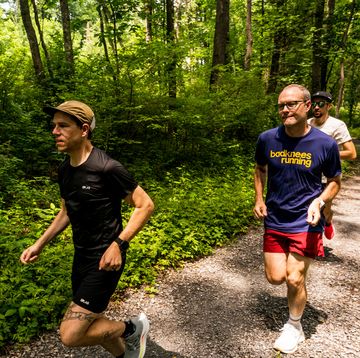Interesting new study from the group of Samuele Marcora, the researcher whose Health & Injuries, just published in Medicine & Science in Sports & Exercise. In this case, he decided to look at the effects of "self-talk" on endurance performances -- a familiar sports-psychology strategy that is very popular but has seldom been tested in isolation.
The design of the study, which was led by Marcora's grad student Anthony Blanchfield, was pretty simple. Take 24 volunteers and have them do a cycling test to exhaustion; give half of them a two-week self-talk intervention; and then do another cycling test to exhaustion and see if they've improved relative to controls. In this case, the answer was yes: the self-talk group lasted18% longer (637 to 750 seconds) while the control group stayed the same. The rating of perceived exertion (RPE) on a 10-point scale also climbed more slowly in the self-talk group; in other words, they were able to convince themselves that the exercise felt easier. (I should note that time-to-exhaustion tests are different from actual races: the improvement was very significant, but you wouldn't expect to see anywhere near that big a boost in a race or time-trial, where a percent or two would be great.)
So what did this self-talk involve? First the participants spent half an hour writing down self-talk statements they'd used in the past and looking at other suggested self-talk statements. They had to choose four favorite motivational statements: two for the early stages of the exercise (e.g. "feeling good") and two for the later stages (e.g. "push through this"). Then over the next two weeks, they were instructed to use these statements during their exercise sessions, and swap out phrases that they didn't like until they found four they were comfortable with. That's pretty much it.
Of course, most of us use some form of self-talk naturally. After the experiment, for example, 10 of the 12 people in the control group reported that they'd also used some form of self-talk during the tests. But the results suggest that there's some benefit to planning ahead and being deliberate about what phrases you use. After all, it's all too easy to slip into negative self-talk like "This is really hard... I don't think I can keep going" -- which becomes a self-fulfilling prophecy.
How did the self-talk actually work? Marcora interprets these results in the context of his psychobiological model of endurance performance, which posits that "exhaustion is caused by the conscious decision to terminate endurance exercise, as opposed to muscle fatigue. As such, an individual will terminate endurance exercise either when the effort required by the task exceeds the greatest amount of effort that the individual is willing to exert during the task (potential motivation), or when maximal effort is considered to have occurred and continuation of the task is perceived as impossible." In this view, perceived effort is the fundamental determinant of performance, which is why "interventions such as sleep deprivation, naloxone administration and mental fatigue have been shown to elevate rating of perceived exertion (RPE) and hinder endurance performance, whereas interventions such as physical training, nutritional intake and psycho-stimulant manipulations have been shown to reduce RPE and enhance endurance performance."
Theorizing aside, I think the practical message here is pretty clear: no matter how fit you are, you ignore what's going on inside your head at your peril.
***
Read Health & Injuries, and follow the latest posts via Twitter, Facebook, or RSS.












